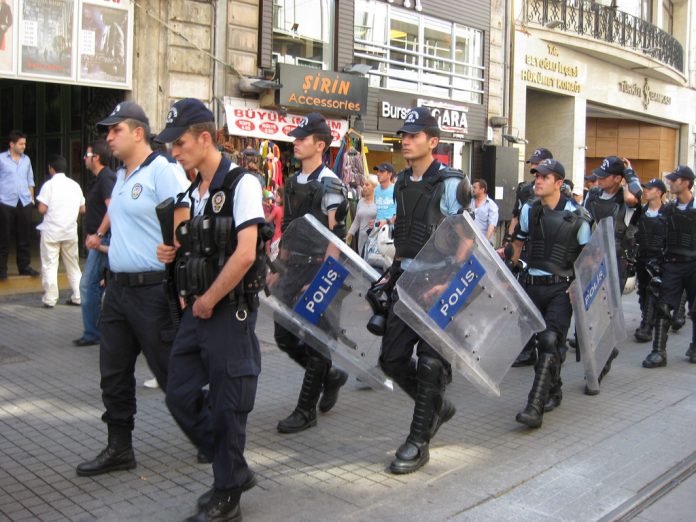Being a Turkish diplomat and defending President Erdogan’s policies of the Turkish government in international platforms has been one of the toughest jobs in recent years. Unfortunately, Turkish diplomats have been desperately striving to persuade international community of Ankara’s pathetic excuses for Turkey’s day by day worsening profile. What Ambassador Faruk Kaymakci, Permanent Repr. of Turkey to the EU, tried in his latest interview was one of the examples of this smear campaign.
In response to accusations of systematic torture, kidnappings, extrajudicial killings, purges, authoritarianism, narrowing space of press freedom, etc. in the recent report of the European Commission, Mr. Kaymakci raises the issues like coup attempt, terrorism, migration and regional conflicts. When asked about the two Greek soldiers arrested in Turkey about a month ago, he reminds us that “Turkey is going through difficult times” and wants us to leave the issue to the court. Is it possible that he does not know that President Erdogan recommended to Greek government not to leave the decision on the extradition of Turkish soldiers who sought asylum to Greece in the aftermath of the coup attempt to courts?
Neither the European Commission nor dozens of other international organizations, which strongly criticized Turkey, are against taking precaution for the threat Turkey faces. The main point in the criticisms intensifies on the objectivity, proportionality, humanity and lawfulness of these precautions. After July 2016 coup attempt, hundreds of thousands, including rights defenders, judges, teachers, doctors, students, journalists, etc. have lost their jobs, freedom, property and dignity without a proper investigation on the event. Most of these people have been subject to physically or psychologically intensive tortures. Just few days ago, a teacher was imprisoned with her newborn baby just because she said “don’t let children die” in the South East of Turkey in a popular tv show. The fight against terrorism cannot be excuse for such violations, but Mr. Kaymakci expects from the Western democracies unconditional support for Erdogan’s crackdowns on his opponents and for his authoritarianism.
Another issue is the changing nature of Turkish diplomacy and foreign policy. Decade ago, Turkey’s foreign policy has been emphasizing soft power, negotiation and economic relations. Being an EU member was the driving force behind Turkey’s democratic reforms. Yet, now, a completely different understanding shapes Turkey’s foreign affairs. Ankara follows a policy which prioritize a belli gerent and rogue approach in its foreign relations from the Aegean Sea to Syria. Instead of solving its problems with Greece and Cyprus through peaceful means, Ankara chooses to bully its neighbors. If he finds an opportunity, Erdogan will not refrain from using force, like in Afrin in which during the operation, Turkish jets indiscriminately bombed civilian population in the area and caused hundreds of civilian casualties. After the operation, Ankara allowed its allied Free Syrian Army fighters to plunder the city. Now, there is a well-established fear that Ankara will carry out a demographic change as implied by Mr. Kaymakci who said that they secure the area so that “Afrin people, who are already in Turkey [350,000], can go back to their homes.”
On top of it, Turkish diplomacy has undertaken a new assignment: kidnapping and spying on Erdogan’s dissidents all around the world. Realizing that great majority of the states will not recognize those who he blames as terrorists, Ankara has decided to run kidnapping operations or establish spy webs by exploiting diplomatic privileges of its diplomats. There are ongoing investigations in Switzerland and Kosovo on Turkey’s such actions. It was also reported that plot of Turkish intel to kidnap Turkish dissidents in Germany and the Netherlands have failed due to precautions taken by the local spy agencies. Most recently, Kurdish leader Salih Muslim said that Turkish authorities tried to take him away without a court decision during his detention in Czechia. He said if he did not manage to call one of his friends to inform about his detention, he believes he would have ended up somewhere like those in Kosovo did. What happened in Belgium was more humiliating for the Turkish diplomacy. It was revealed that the twitter account, which threatened a dissident Belgian-Turkish reporter and inciting the Turkish community against him, was administered from the Turkish Embassy in Brussels. Apart from its criminal or moral aspects, the level the Turkish Foreign Ministry has gone down is a black mark in its long-standing history.
On the other hand, Turkey’s surprising tolerance towards radical terrorists, whether in Syria or Turkey, is a remarkable point in the light of its extreme counter-terrorism measures. These internationally recognized terrorists cooperate with the Turkish intelligence in Syria and take shelter in Turkey, while Turkish consulates deny serving many Turkish citizens abroad.
Dr Ugur Tok is the Director of Platform for Peace and Justice in Brussels, http://www.platformpj.org/

